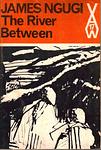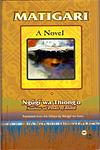Ngugi wa Thiong'o
Ngugi wa Thiong'o is a prominent Kenyan writer and academic, renowned for his plays, novels, and essays that deal with the collision between African culture and colonialism. He writes primarily in Gikuyu and Swahili and is an advocate for promoting African languages. His work often addresses the issues of post-colonial identity, politics, and the impact of language on culture and society.
Books
This list of books are ONLY the books that have been ranked on the lists that are aggregated on this site. This is not a comprehensive list of all books by this author.
-
1. A Grain Of Wheat
"A Grain of Wheat" is a historical novel set in Kenya during the Mau Mau uprising against British colonial rule. The story follows a diverse cast of characters whose lives are intertwined by secrets, betrayals, and sacrifices. As Kenya prepares for independence, the book explores themes of nationalism, identity, and the complex aftermath of revolution. Through vivid storytelling, the author delves into the complexities of human nature and the struggle for freedom in a turbulent time.
-
2. Petals of blood
This novel tells the story of four characters living in post-colonial Kenya, who are arrested for the murder of three prominent figures in their village. As the narrative unfolds, it explores their personal histories and how they are intertwined with the political, social, and economic transformations of the nation. The book is a critique of the corruption and inequality that emerged in Kenya after the end of colonial rule, and a call for a return to communal values and practices.
-
3. The River Between
"The River Between" explores the lives of the Gikuyu people living in the Kenyan highlands during the early days of white settlement. The novel focuses on the struggle between two villages, each with differing views on the encroaching influence of the Christian missionaries. The protagonist, a young man torn between the traditional values of his people and the new ideas brought by the missionaries, serves as a symbol of the larger conflict. The narrative delves into themes of love, cultural identity, religious conflict, and the struggle for independence.
-
4. Matigari
"Matigari" is a novel set in a post-colonial African nation, where the protagonist, who is a freedom fighter, emerges from the forest after the country's liberation, intent on finding justice and peace. However, he finds a society still deeply entrenched in corruption and oppression. The narrative uses allegory and symbolism to explore themes of justice, truth, and the fight against inequality. The protagonist's quest for justice becomes a threat to the government, leading to a manhunt for a man who is merely a myth.
-
5. Caitaani Mutharaba Ini
"Caitaani Mutharaba Ini" is a captivating novel that explores the complexities of human nature and the consequences of one's actions. Set in a small African village, the story follows the lives of various characters who are entangled in a web of love, betrayal, and power struggles. As the narrative unfolds, the book delves into themes of corruption, greed, and the clash between tradition and modernity, offering a thought-provoking reflection on the challenges faced by individuals in a rapidly changing society.
-
6. Wizard of the Crow
The book is a satirical exploration of a fictional African dictatorship, focusing on the rule of a despotic leader and the corruption and power struggles within his regime. Amidst this political turmoil, a self-proclaimed wizard and a rebellious young woman become entangled in the machinations of the state, and their actions ultimately challenge the status quo. The novel combines elements of magic realism with political satire, providing a critique of post-colonial African politics while also exploring themes of love, power, and resistance.





